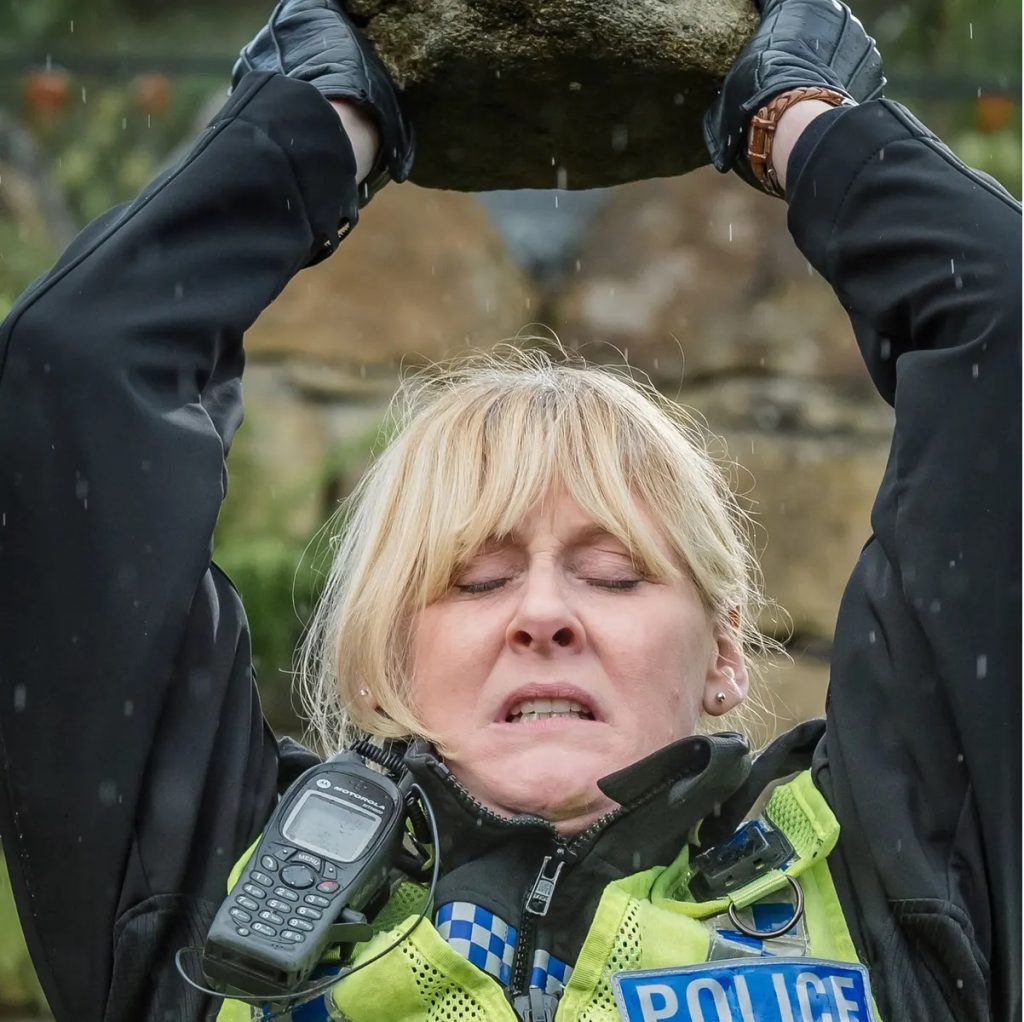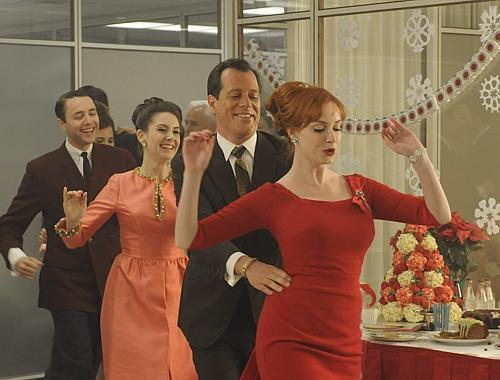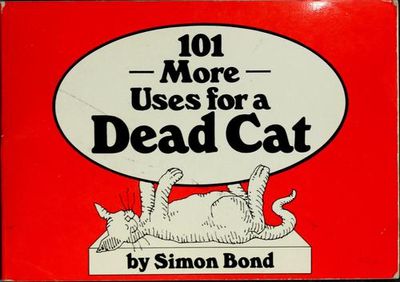Season – I do beg your pardon – Series – three of Happy Valley is back and in mid-flow. Tommy has just escaped custody, donning lycra by way of disguise and wobbling off down the high street exactly like someone who’d been in prison for a few years probably would. Or maybe that was a wobbly bit of real life creeping in? Who knows, in these times of immersive acting?
Anyway, thus far the series is a triumph. Helped by weekly release, like in the old days, rather than a singular dump of someone’s cherished, years-long project onto some streaming platform for our momentary attention and fleeting gratification, it’s rekindled something of the old spirit of television. You can hear people saying, did you see Happy Valley last night?. And I’m loving It too. But… and I mean this in the nicest possible way, because more talent has gone into a minute of Happy Valley than I could muster in a year, and I really do love it, but… are the plot lines just a tad repetitive? Could Happy Valley itself be a serial offender?
The thing I really like about Happy Valley is the way in which it moves across dramatic genres (I think that’s the right way of putting it), without becoming clunky. As a result, it’s very hard to pigeon-hole: I suppose if I had to assign it a category, I think I’d go for ‘black comedy’, but that doesn’t do it justice. Happy Valley is not primarily a cop show or a crime drama; that is almost incidental. I see it more as a farce: it is populated by characters beset by ineptitude, limited insight and subject to every human weakness, including kindness. It is that humanity – a study of how humdrum failings can have catastrophic consequences – that makes Happy Halley different from the run-of-the-mill and, dare I say it, marks it as distinctively British in one of the few ways that I feel comfortable talking about ‘Britishness’.
What elevates that study of human failing above the ‘Ha Ha’ sort of comedy to achieve an uncommon level of pathos, is the ever-present possibility of real terror. Series one revolves around the kidnap of Ann Gallagher bought about by a fatal coming-together of one little man’s pent-up resentment – accountant Kevin Wetherill – and another man’s oddly naïve approach to serious crime – Ashley Cowgill. It is, in many respects a comedy of errors: a farce in which no-one really wants what they think they think they want and realization only dawns once events have become unstoppable. I suppose, recalling Hardy, one might describe Happy Valley as a Satire of Circumstance.
But if the kidnap of Ann Gallagher itself is both messy and brutal, the murder of the young PC, Kirsten McAskill, is truly shocking. And yet, dare I suggest, the element of humour, albeit of the blackest kind, isn’t that far away. The scene unfolds as an interaction between a frightened, nervous, young man who has very visibly been beaten up, and a professional young woman not yet comfortable in her position of authority. The tweaking of the characters’ respective gender roles gives the scene an unpredictability that could be played out in almost any direction. There is the awkwardness of a young, self-conscious man thrown into proximity of a brighter, more attractive, young woman that, in another drama, might work as the basis for an unlikely romantic comedy. On the other hand, the driver’s – Whippy’s – bruised face invokes a maternal response where it should have aroused immediate suspicion; perhaps he’ll be advised to see a docror and to drive a little more safely in future: another missed opportunity. What doesn’t seem likely is that Whippy will find within himself an assertive masculinity to either blag or bully his way out. That falls to Tommy.
What happens next is, to misappropriate Hobbes, nasty, brutish and short, but all the more so because it is utterly devoid of the humanity, in all of it’s imperfection, of the exchange between Whippy and Pc McAskill. What with the plaintive bleep of the McAskill’s radio instead of music over the credits, I felt like I’d been repeatedly run-over myself.
Both elements, the human and the inhumane, are heightened by contrast with the other, but the challenge for writer and actors alike, is to plausibly manage the transition between them. In this respect, the casting of James Norton (Tommy Lee-Royce) is inspired, of Sarah Lancashire (as Catherine Cawood) is assured, while Sally Wainwright’s writing has been fulsomely and justly praised. I would go so far as to say that Series one is possibly the finest TV drama I’ve seen, though it’d be a tough call against Spiral…
But didn’t I start by grumbling something about repetition? Well…. It pains me but…. consider.
Series one: Outwardly mild-mannered accountant Kevin Weatherill is in fact a tightly-wound spring. Although he ought to be content with his wife and children in middle-class suburbia, Weatherill feels trapped by bitter circumstance and that he deserves more from life. Things are tense at home.
Unable to contain his rage, Wetherill rashly suggests to acquaintance Ashley Cowgill that he (Cowgill) kidnap his (Weatherill’s) boss’ daughter. It all goes wrong, of course, because sly-but-inept builder / criminal Cowgill has inadvertently employed a psycho in the guise of Tommy Lee-Royce, and events run away from them. Cowgill ends up out of his depth, as does Weatherill, who’s inner torment is ratcheted up further by having to manage conflicting feelings of regret, fear and injustice at work, where he has to support his boss while at the same time concealing his guilt.
During all of this, Catherine Cawood has received a superficial facial injury during a tangentially related arrest (the ice cream van drug dealers) that she shrugs off. Later, she is beaten to within an inch of her life by Tommy Lee-Royce. Fortunately for justice, Cawood has previously noted Kevin Weatherill’s number plate and has started to link the dots.
Tommy Lee-Royce does some more nasty things to tidy-up the kidnapping loose-ends and focus shifts to his growing obsession with Cawood’s grandson, Ryan, whom Lee-Royce now believes to be his own son. Fortunately, Cawood is onto him and apprehends Lee-Royce after returning the kicking she received herself.
The series ends with Lee-Royce heading for a long prison sentence, Wetherill also in prison, unreformed in his bitterness, and Cowgill rather shockingly killed to ensure his silence on other, drug-related, matters. Justice is therefore done and all is apparently resolved.
Series two: Outwardly mild-mannered Detective Sergeant John Wadsworth is in fact a tightly-wound spring. Although he ought to be content with a wife and children in middle-class suburbia, things are tense at home, not least because he is having an affair with a woman called Vicky Flemming. Wadsworth is essentially Wethterill and Cowgill rolled into one. It all goes wrong, of course, because slippery-but-inept Wadsworth has inadvertently chosen to have an affair with a psycho, in the guise of Vicky Flemming, who then blackmails him. Trapped by Flemming, Wadsworth is unable to contain his rage and kills her. Out of his depth, his inner torment is ratcheted up further by having to manage conflicting feelings of regret, fear and injustice at work, where he has to support the investigation into Fleming’s death while at the same time concealing his own guilt.
In parallel, tension is increasingly focused on Lee-Royce’s obsession with Cawood’s grandson, Ryan, whom Lee-Royce believes to be his own son. This time, he can’t do anything to Ryan directly because he is in prison, and so manipulates prison visitor Frances Wealand to groom Ryan on his behalf. Fortunately, Cawood is onto him and she is able to apprehend Wealand before any harm comes to Ryan.
The series ends with Lee-Royce still in prison, Wealand presumably facing some sort of legal action for her various deceptions, though dramatic justice is served by her being disabused of her naivety in believing she had any sort of genuine relationship with Lee-Royce. Cawood is also onto Wadsworth who desperately, though ineptly, attempts to flee before desperately, though ineptly, attempting suicide by jumping from a low bridge. Fortunately for dramatic resolution, a passing car makes a better job of it, and he is killed rather shockingly.
Series three, episodes 1-3: Outwardly mild-mannered pharmacist Faisal Bhatti is in fact a tightly-wound spring. Although he ought to be content with his wife and children in middle-class suburbia, things are tense at home, not least because he is having an affair with a woman called Joanna Hepworth whom he is supplying with prescription drugs. Both have inadvertently become embroiled with psychos: Hepworth because she married one, and Bhatti because his supplying of drugs has drawn the attention of local dealers who proceed to blackmail him.
Trapped in an abusive relationship with her psycho husband, Hepworth also tries to blackmail Bhatti. Trapped by her, Bhatti is unable to contain his rage and kills her. Out of his depth, his inner torment is ratcheted up further by having to manage conflicting feelings of regret, fear and injustice while maintaining a semblance of normality.
Meanwhile, in an echo of series one, Catherine Cawood has received a superficial facial injury during a tangentially related arrest that she shrugs off. I fear this may bode ill for her future health. She has also noted a number plate, which I suspect may be the undoing of the drug dealers.
In parallel, tension is increasingly focused on Lee-Royce’s obsession with Cawood’s grandson, Ryan, whom Lee-Royce believes to be his own son. His previous grooming-by-proxy of Ryan has proven to be effective, and Ryan is now regularly visiting Lee-Royce in prison. Now that Lee-Royce has just wobbled his way to freedom at the end of episode three, I suspect unmediatred contact is only a matter of time as they will undoubtedly be drawn to each other. I’m sure Cawood is onto him, and I suspect Lee-Royce’s obsession will be his downfall (again), but we’ll have to wait and see.
Am I being mean? Of course I am. My excuse is that one of the joys of Happy Valley is it being so specific to a location and I can’t see anyone from that neck of the woods heaping unmitigated praise on anything. I love Happy Valley; series one was nigh-on perfect because of the the way the main Lee-Royce-obsession-with-Ryan plot emerged seamlessly from the Lee-Royce / Weathterill / Cowgill / kidnap plot. Series two wobbled a bit because the two plot lines – the Lee-Royce / Wealand -obsession-with-Ryan-plot ran parallel to the Wadsworth / Flemming murder without any substantive connection. There were, however, many redeeming features, not least the Alison Garr character / subplot.
I suppose the thing that started to ring a little alarm bell for me was the affection with which people welcomed the return of Catherine Cawood and Happy Valley as if she were a sort of fictional national treasure, which, I suppose she is. You’d think, of course, that this was entirely a good thing; a fictional police officer rooted in the specific context of small-town northern England, all the time contending with the kind of humdrum we can all identify with, that the nation had taken to heart. But… the thing that absolutely grabbed me about the first series was that ever-present real possibility of malice. That it could turn nasty on a sixpence. That, like the tightly-wound characters, the viewer could never relax for a moment. It was never cosy viewing the way Scandi-noire became, despite more, more gruesome, ostensibly more disturbing deaths that, in the end, failed to engage as the genre became just that; a genre. I don’t want that to happen in Happy Valley and that’s what I’m worried it will become: a safe-bet for a night’s viewing. That it will loose it’s power to disturb, to really stress you out because of the way it balances on a knife edge between farce and horror, all the while maintaining compassion for every compromised character as they struggle to make their way through the day-to-day.
Please don’t let’s look forward to series four like a visit from an old friend, or putting your feet into familiar slippers. Let’s see.




